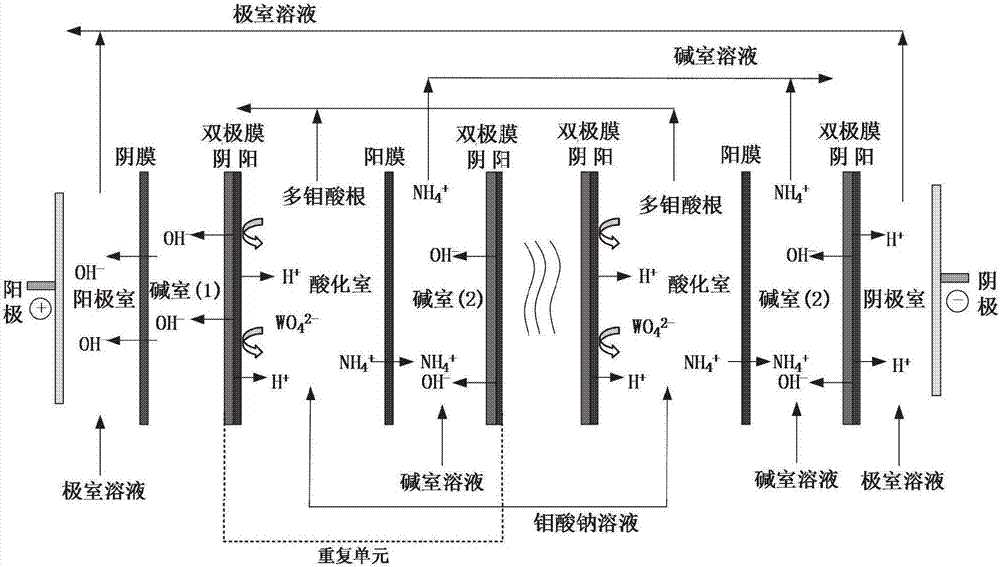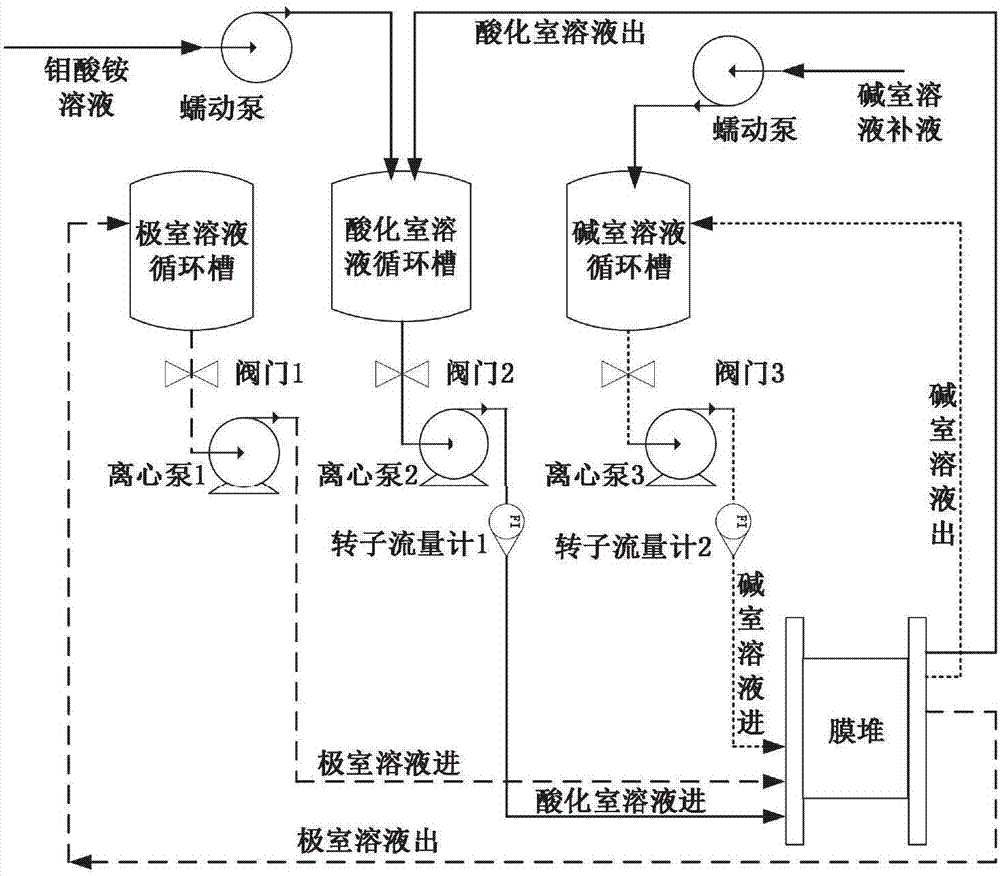Method for preparing ammonium polymolybdate solution based on bipolar membrane electrodialysis
A technology of bipolar membrane electrodialysis and ammonium polymolybdate, applied in electrodialysis, preparation of molybdenum compounds, chemical instruments and methods, etc., can solve the problems of high energy consumption, large consumption, and large equipment investment, and achieve equipment investment Low, low power consumption, high molybdenum yield effect
- Summary
- Abstract
- Description
- Claims
- Application Information
AI Technical Summary
Problems solved by technology
Method used
Image
Examples
Embodiment 1
[0067] Using a basic structure such as figure 2 In the electrodialysis system shown, the membrane stack of the electrodialyzer includes 20 two-chamber units, and the effective area of a single membrane is 0.02m 2 , the bipolar membrane is NEOSEPTA BP-1, the cation exchange membrane is NEOSEPTA CMB, the anode and cathode are both titanium-plated nickel-plated electrodes, and the membrane stack structure is as follows figure 1 shown. Ammonium molybdate solution contains Mo 103.45g / L. The solution initially filled into the circulation tank of the acidification chamber is ammonium polymolybdate solution, in which Mo is 125.0g / L, the pH value is about 3.0, and the volume is 6.0L. The solution initially filled into the circulation tank of the alkali chamber is NH 4 HCO 3 solution with a concentration of 1.0 mol / L and a volume of 5 L. The solution continuously added to the alkali chamber is 1.0mol / L NH 4 HCO 3 solution. The solution initially filled into the circulation ta...
Embodiment 2
[0069] Using a basic structure such as figure 2 The electrodialysis system shown, wherein the membrane stack of the electrodialyzer is the same as that of embodiment 1. The ammonium molybdate solution contains Mo 62.6g / L. The solution initially filled into the circulation tank of the acidification chamber is obtained by diluting the ammonium polymolybdate solution prepared in Example 1 with deionized water, in which the Mo content is 62.5g / L, the pH value is about 2.0, and the volume is 6.0L.
[0070] The solution initially filled into the circulation tank of the alkali chamber is (NH 4 ) 2 CO 3 solution with a concentration of 0.1mol / L and a volume of 5L. The solution that is going to be continuously added to the alkali chamber is also a concentration of 0.1mol / L (NH 4 ) 2 CO 3 solution. The solution initially filled into the circulation tank of the electrode chamber is NH 4 OH solution with a concentration of 1.0mol / L and a volume of 5L. After the power-on operati...
Embodiment 3
[0072] The equipment used is the same as that of Example 1, except that the cathode and anode are platinum-plated titanium plate electrodes. Ammonium molybdate solution contains Mo 41.4g / L. The solution initially filled into the circulation tank of the acidification chamber is obtained by diluting the ammonium polymolybdate solution prepared in Example 2 with deionized water, wherein the Mo is 8.56g / L, the pH value is about 4.0, and the volume is 6.0L. The solution initially filled into the circulation tank of the alkali chamber is NH 4 NO 3 solution with a concentration of 0.5mol / L and a volume of 5L. The solution to be continuously added to the alkali chamber is NH with a concentration of 0.5mol / L 4 NO 3 solution. The solution initially filled into the circulation tank of the electrode chamber is NH 4 NO 3 solution with a concentration of 1.0 mol / L and a volume of 5 L. After the electrodialysis operation starts, the ammonium molybdate solution is continuously added t...
PUM
 Login to View More
Login to View More Abstract
Description
Claims
Application Information
 Login to View More
Login to View More - R&D
- Intellectual Property
- Life Sciences
- Materials
- Tech Scout
- Unparalleled Data Quality
- Higher Quality Content
- 60% Fewer Hallucinations
Browse by: Latest US Patents, China's latest patents, Technical Efficacy Thesaurus, Application Domain, Technology Topic, Popular Technical Reports.
© 2025 PatSnap. All rights reserved.Legal|Privacy policy|Modern Slavery Act Transparency Statement|Sitemap|About US| Contact US: help@patsnap.com


